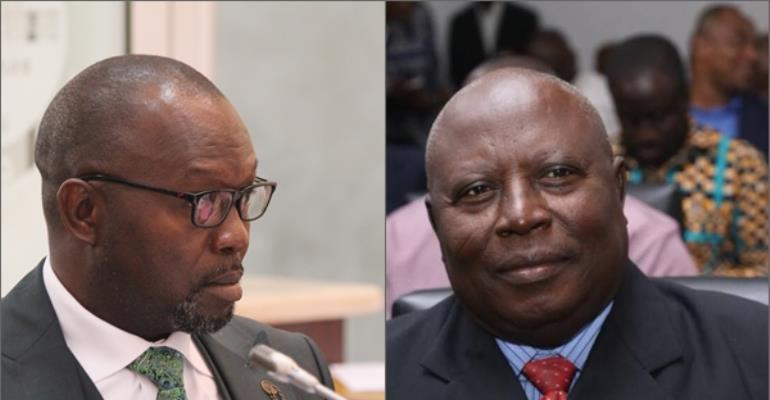
Vetting of Amidu to go on despite court suit
Chairman of the Appointments Committee of Parliament, Mr Joseph Osei-Wusu, says the vetting og Mr Martin Amidu would go ahead today despite the suit filed at the Supreme Court by a former Deputy Attorney-General, Dr Dominic Ayine.
According to Mr Osei-Wusu, the vetting would go ahead because neither the committee nor the office of Parliament has been served with a copy of the suit.
Advertisement
Dr Ayine is court to challenge the age of Mr Amidu, the Special Prosecutor designate.
He is praying the court to declare that, by reason of the fact that Mr Amidu is 66 years old, he is not qualified to be nominated as the Special Prosecutor under Section 13 (3) of the Office of the Special Prosecutor Act, 2018 (Act 959).
The applicant, who has joined the Attorney-General to the suit as a co-defendant, is seeking a further declaration that, by reason of his age, Mr Amidu is not qualified or eligible to be approved by Parliament as the Special Prosecutor under Section 13 (3) of the Office of the Special Prosecutor Act, 2018 (Act 959), is unconstitutional and, therefore, null and void.
He is also seeking a declaration that any purported nomination by the Attorney-General or approval by Parliament or appointment by the President of the Republic of Mr Amidu as the Special Prosecutor, under Section 13 (3) of the Office of the Special Prosecutor Act, 2018 (Act 959), is unconstitutional and, therefore, null and void.
Dr Ayine further prayed that “in the event Martin Alamisi Burns Kaiser Amidu has already been vetted and approved by Parliament and/or appointed by His Excellency the President of the Republic as the Special Prosecutor under Section 13 (3) of the Office of the Special Prosecutor Act 2018 (Act 959) prior to the final determination of this suit, an order annulling such nomination, approval and appointment”.
Additionally, the applicant is praying the court for a declaration that, by a true and proper interpretation of articles 190 (1) (d) and 199 (4) of the 1992 Constitution, no person above the age of 65 is eligible for employment in any public office created under Article 190(1) (d).
He argues that by a true and proper interpretation of articles 190 (1) (d), 199 (1), 199 (4) and 295 of the 1992 Constitution, the retiring age of all holders of public offices created pursuant to Article 190 (1) (d) is 60 years and not beyond 65 years.
Suit
The writ seeking to invoke the original jurisdiction of the Supreme Court was filed on Dr Ayine’s behalf by a legal practitioner, Mr Tony Lithur, in Accra yesterday.
The writ came on the heels of Mr Amidu’s planned vetting in Parliament today.
It is unclear whether or not Parliament will proceed with the vetting following the filing of the writ.
Statement of case
A statement of case accompanying the applicant’s writ stated that by nominating and appointing Mr Amidu to be vetted and approved by Parliament, both the Attorney-General and the President, respectively, had violated Article 199 (1) of the 1992 Constitution.
“If Parliament proceeds to approve his appointment, it will also be acting unconstitutionally. I pray, therefore, that the 2nd defendant’s nomination and appointment be declared null and void and of no effect.
“If, notwithstanding the pendency of this suit, Parliament proceeds to approve his appointment, I pray also that such approval should be declared null and void and of no effect,” the statement of case, signed by Mr Lithur, stated.
It further said the sole legal issue for determination in the suit was whether or not, on a true and proper interpretation of articles 190 (1) (d), 199 (1), 199 (4) and 295 of the 1992 Constitution, Mr Amidu, having already attained the age of 66 years as of September 6, 2017, was qualified or eligible to be nominated by the Attorney-General, appointed by the President and approved by Parliament to serve in the public services generally and specifically as the Special Prosecutor under Section 13 (3) of the Office of the Special Prosecutor Act, 2018 (Act 959).
“As stated above, the Office of the Special Prosecutor was established by an Act of Parliament pursuant under Article 190 (1) (d) of the 1992 Constitution, which confers on Parliament the power to create such other public services as it may prescribe, in addition to the public services spelt out in the Chapter 14 of the 1992 Constitution.
“The Office of the Special Prosecutor is thus a creature of the Constitution to the extent that it is a direct offshoot of a power drawn from Article 190. Once Parliament passed Act 959 and the President assented to it on January 2, 2018, the Office of the Special Prosecutor became part of the public service and governed by the constitutional provisions relating to the public service and public office holders,” the statement of case noted.




